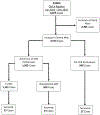Evaluation of telephone-assisted cardiopulmonary resuscitation recommendations for out-of-hospital cardiac arrest
- PMID: 35870555
- PMCID: PMC10013180
- DOI: 10.1016/j.resuscitation.2022.07.021
Evaluation of telephone-assisted cardiopulmonary resuscitation recommendations for out-of-hospital cardiac arrest
Abstract
Aim of the study: While out-of-hospital cardiac arrest (OHCA) is associated with poor survival, early bystander CPR (B-CPR) and telephone CPR (T-CPR) improves survival from OHCA. American Heart Association (AHA) Scientific Statements outline recommendations for T-CPR. We assessed these recommendations and hypothesized that meeting performance standards is associated with increased likelihood of survival. Additional variables were analyzed to identify future performance measurements.
Methods: We conducted a retrospective cohort study of non-traumatic, adult, OHCA using the Singapore Pan-Asian Resuscitation Outcomes Study. The primary outcome was likelihood of survival; secondary outcomes were pre-hospital Return of Spontaneous Circulation (ROSC) and B-CPR.
Results: From 2012 to 2016, 2,574 arrests met inclusion criteria. Mean age was 68 ± 15; of 2,574, 1,125 (44%) received T-CPR with 5% (135/2574) survival. T-CPR cases that met the Lerner et al. performance metrics analyzed, demonstrated no statistically significant association with survival. Cases which met the Kurz et al. criteria, "Time for Dispatch to Recognize Need for CPR" and "Time to First Compression," had adjusted odds ratios of survival of 1.01 (95% CI:1.00, 1.02; p = <0.01) and 0.99 (95% CI:0.99, 0.99; p = <0.01), respectively. Identified barriers to CPR decreased the odds of T-CPR and B-CPR being performed. Patients with prehospital ROSC had higher odds of B-CPR being performed. EMS response time < 8 minutes was associated with increased survival among patients receiving T-CPR.
Conclusion: AHA scientific statements on T-CPR programs serve as ideal starting points for increasing the quality of T-CPR systems and patient outcomes. More work is needed to identify other system performance measures.
Keywords: Cardiopulmonary resuscitation; Out-of-hospital cardiac arrest; Telephone CPR.
Copyright © 2022 Elsevier B.V. All rights reserved.
Figures
References
-
- Nichol G, Stiell IG, Laupacis A, Pham B, De Maio VJ, Wells GA. A cumulative meta-analysis of the effectiveness of defibrillator-capable emergency medical services for victims of out-of-hospital cardiac arrest. Ann Emerg Med. 1999;34(4 Pt 1):517–525. - PubMed
-
- Eberhard KE, Linderoth G, Gregers MCT, Lippert F, Folke F. Impact of dispatcher-assisted cardiopulmonary resuscitation on neurologically intact survival in out-of-hospital cardiac arrest: a systematic review. Scand J Trauma Resusc Emerg Med. 2021;29(1):70. doi: 10.1186/s13049-021-00875-5 - DOI - PMC - PubMed
Publication types
MeSH terms
Grants and funding
LinkOut - more resources
Full Text Sources
Medical
Research Materials
Miscellaneous


